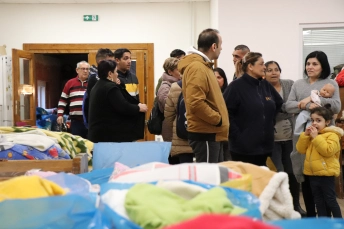Three hundred kilometers. That’s the average round trip Cooperative Baptist Fellowship field personnel Eddie Aldape often makes as he transports goods and people to and from the Ukrainian border towns in Slovakia.
There, 250,000 Ukrainian refugees have come since early March — some for a few days as they connect with family and friends in other countries and others for a week or more, as they search for somewhere to go. They are in churches, temporary lodging centers and hotels, relying on donations to survive and leaning on frantic communication from strangers acting on their behalf, hoping just to stay together and get somewhere safe. The days are long and, for Aldape, often blur into the night with a border that doesn’t close just because its bedtime.
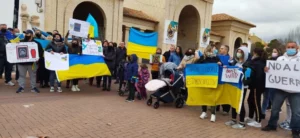
Eddie and wife Macarena serve in Albacete, Spain, where residents show their support for the people of Ukraine.
A CBF field personnel serving in Albacete, Spain, and a veteran firefighter, he possesses an urge to help others that is intrinsic. Aldape is rarely concerned with what time it is. That’s a good thing, because he often hits the road at 9 a.m. and doesn’t return until after midnight.
He works until he’s done all he can that day, and then he goes to bed looking forward to doing it again the next day. In fact, that mindset is what sparked his temporary move to Slovakia. In Spain, he and his wife, Macarena, already were providing their own ministry support to Ukrainian refugees; so, when tensions increased for their families back home, Aldape wanted to do more.
He works until he’s done all he can that day, and then he goes to bed looking forward to doing it again the next day.
“When these families would come to these border towns and were trying to take a train out of Ukraine, there were just gobs of people. You’d get to the front of the line thinking you’re going to Romania, and you’d end up in Poland,” Aldape said. “They didn’t know where they were, often couldn’t communicate. I thought if I was a little bit closer, I could help.”
Getting closer to the need
He started writing to different pastors and field personnel asking who needed his help. Shane McNary, CBF field personnel in Slovakia, was the first to respond. McNary had received $30,000 from CBF’s Ukraine Relief Fund to purchase and set up a central distribution center in Markovce, Slovakia, where churches could centralize the goods they had collected to help refugees there and those still in Ukraine.
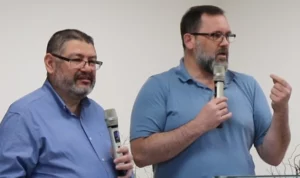
Shane McNary (right) translating for Eddie Aldape (left) during a church service in Slovakia.
More than 1,000 CBF individuals, churches, partners and state and regional organizations have given in excess of $400,000 to CBF’s Ukraine Relief Fund in the month since Russia invaded Ukraine.
Aldape requested and received permission to go and received $7,000 from the Ukraine Relief Fund for his own travel expenses, lodging and to rent a van to help transport those goods and help women, men and families get from the border to wherever they needed to go.
When he arrived on March 16, there weren’t any large vans to be rented, and local pastors were afraid to wake him up after hours. “That’s what I am here for!” Aldape would petition. With a smaller van, but more to spend on fuel (and a reputation for working around the clock), he hit the ground running. First, he helped repair a church where refugees were staying, and now he regularly picks up groups from the border and takes them to churches, hotels, train stations, bus depots, airports and even to relatives’ homes.
He loads his van with supplies to unpack at the border, or to stock and organize the new distribution center. He provides the families at the hotel in Vel’ké Kapuşany (pronounced Kapushani) with coloring books and table games, and, when he can, surprises the occupants with special dinners, like kabobs and popcorn. He creates community amidst the chaos, rallying refugees to help him during the day.
Community for the Roma
Aldape also has helped cultivate a temporary community for the Roma people. Longtime victims of discrimination in Europe, Romani refugees coming from Ukraine aren’t sent to the same centers as other families. They’re sent to old prisons where the facilities are not-so-subtly subpar. Aldape and Macarena had many Banjara friends and connections in India, so his heart to help them is big. The border centers know they can call him when any refugees arrive and as a result, they’ve been able to give these people a safe and comfortable place to stay.
“We’ll take anyone who needs a place to go,” said Aldape, who is collaborating with five Roma Apostolic and independent churches and has about 15 rooms (and counting) at the hotel in Vel’ké Kapuşany.
“We’ll take anyone who needs a place to go.”
One of the largest groups Aldape has helped host at the hotel are members of the same Romani church in Ukraine. Their senior pastor organized deacons and associate pastors to shepherd this group across the border. Some are relatives and they’re all very close, so they wanted to stay together. By way of Aldape’s van, a bus station, a train ride and a plane ticket, they’ll soon land in Norway, all still together. Another group consists of 18 people, mostly children. The money Aldape has received from CBF’s Ukraine Relief Fund helps pay for the resources to keep them together and make their stay as comfortable as possible.
“I spend half of my time in the car going from one location to another and the other half taking care of our guests,” he said. “My days are 10- to 16-hour days depending on what is going on.”
With most of that time in the car, he sparks conversation by sharing stories and his own experiences, or he plays Christian music and classics from his Spotify playlist. If it’s possible, he prays for his passengers and the communities through which they drive.
Young people and a Blind Spot
Aldape is deeply touched by the way young people are mobilizing to serve their neighbors. One in particular is a group called Blind Spot. They’re mostly 20-somethings from the Czech Republic, with smart phones in hand and dreadlocks abounding, who are collecting donations at the border and then driving them into Ukraine. Aldape ends up in tears every time he talks about them.
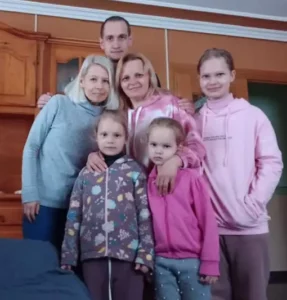
Through their ministry in Albacete, the Aldapes provided support to reunite a Ukrainian family.
“When I got to the place where we were meeting up with them, I remember thinking, ‘Look at all these hippies!’ And of course, you can’t have young people without their computers; so, they all had their devices; but they were using what they knew to find drivers and to find cars, and I was so impressed. Then, when they said they would take it to the border, I was thinking OK, they’re going to take donations to the border and someone will have to come pick them up. But no. They wanted a contact person and an address, because they were going to take it straight to the door, sometimes up to 150 kilometers into Ukraine. Generally, the western side of Ukraine is safe; but you just never know. I just thought, ‘Wow, these guys are the real heroes.’”
Perhaps it makes him emotional because seeing young kids makes him think about his own family.
“On one of our trips to the border, I took two guys with me to take supplies. I asked if anybody needed a ride when we got there, and there we saw a young girl. I thought, gosh that could be my daughter — we need to protect her. How could she be traveling by herself?
“We were supposed to take her to a train station; but when we get there, there were a lot of shady-looking guys hanging around,” Aldape continued. “So, we waited with her and learned the place she was going was really only a few kilometers more, so we ended up dropping her off at her door. Her family was shocked at the type of service she had found. We were just glad to help. We’ve had a few of those situations, where we don’t know the people and they don’t know us but are willing to take our help, which we’re happy to give.”
Member care support
With the long days and short nights that come with working in a crisis, Aldape said he’s been very much in touch with CBF’s member care team.
“These member care people, you know, they always want us to talk about our feelings,” Aldape said, chuckling. “I always say, come on, Latinos don’t do that! We just bottle it up until we explode, right!? But things like this affect us more than we think.
“Talking about your feelings makes you wake up and notice things. So, when I got here, (the member care person) asked me what I was going to do to take care of myself. That day, I was with the people from Blind Spot, and there’s a river that runs right by the place where we met. It was so peaceful to see the water and to hear the birds singing. It was so quiet even though there was all this commotion nearby,” he said. “I just thought, wow, this reminds me that God takes care of the sparrows, so we don’t have to worry. We are so valuable to him. I was able to find peace and sent the care person a video of the spot, saying, ‘I think I found my place.’”
‘Witness in action’
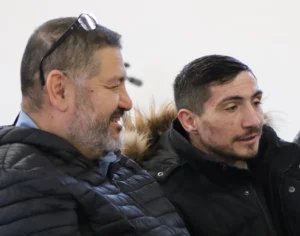
Eddie Aldape (left) sitting with Ukrainian refugees at Apostolic Church in Pavlovce nad Uhom, Slovakia.
Speaking of place, his greatest concern is the condition we are leaving this world in for the next generation. “During one of our drop-offs, those kids from Blind Spot asked who we were, so I told them I was a missionary from Spain. They were so surprised that we were going the extra mile for people we don’t even know,” Aldape said. “I believe (situations like this) are where we come to bear witness in action. I don’t like to go around telling people I’m a Christian; I like to show them what I believe.”
With only a few more weeks in Slovakia, Aldape wants to do as much as he can. Call it the First Responder in him, or the connection he felt with his friends and family back in Spain facing this crisis head on. But the bottom line is he answered God’s call to be the hands and feet of Jesus where he was needed most.
“I have always had to work throughout my life, and I have learned certain skills — some I loved and some I did not,” Aldape said. “But I have come to understand that at one point or another, I have needed those skills and have been able to help because of what I have learned. Every time, I remember where he says, ‘For such a time as this.’ Those skills have allowed me to do things I didn’t know I could do.”
This article originally appeared on the CBFBlog.
Related articles:
Baptists in countries bordering Ukraine open their doors to fleeing refugees
In Ukraine, a 40-member church helps 7,000 people flee war
Ukrainian seminary dean among those shot dead and left on the street by Russian troops

